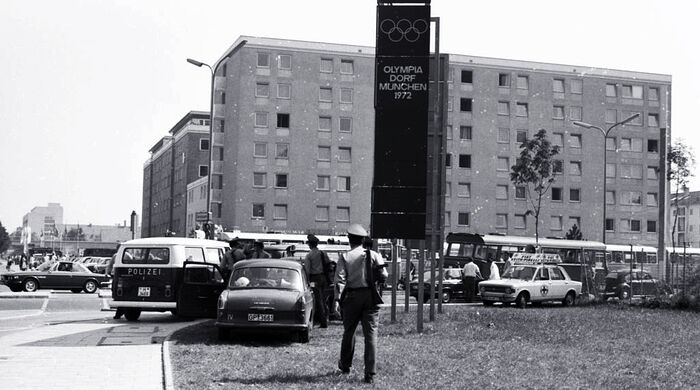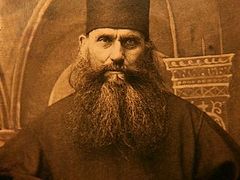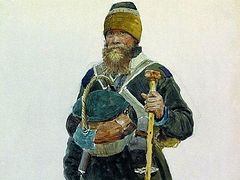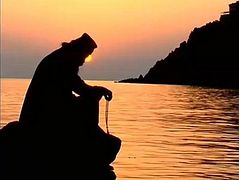Whenever I visit my parishioners, I see that apartment—the site of the terrorist act
I also associate that terrorist attack in Munich with the transfer of literature. I heard about it on TV, when I came to the warehouse to get books for that very man from Alma-Ata. Back then, in 1972, it was a totally novel kind of news. I remember watching on TV how those terrorists, armed with Kalashnikovs, walked on roofs and balconies of a seized building. This made a strong impression on everyone. If we look at it from the extremists’ point of view, we have to admit that the attack was rather well organized.
The gunmen demanded a departure from the airport in the evening, but the police stormed the airport at night. However, since they lacked the experience, it ended in failure. Eleven members of the Israeli team were killed. I saw that moment later on TV, too. It was a huge shock for all of us. Afterwards, airplanes were hijacked and there were other terrorist attacks, but that particular incident was, in my opinion, one of the first, if not the very first, in history.
Nowadays, the house, the location of the hostage situation, has a memorial plaque with the etched names of the Israeli athletes who perished there. German authorities are currently in discussions concerning what kind of commemorative events to hold on the 50th anniversary. It turned out it entails great difficulties here. But that’s another subject.
I have a family of parishioners residing in the Olympic Village, and anytime I visit them, I have an opportunity to observe from their balcony the apartment where the tragic events unfolded.
Many years following the attack, Andrei Yakovlevich Ostapchuk, a high-class physicist who “chases” elementary particles in the cyclotron at the European Center for Nuclear Research (CERN), moved with his family into that very apartment where everything took place (it’s a two-story apartment with stairs).
Their children went to our parochial school to study the Law of God; they enjoyed attending the All-Night Vigil and other services, and Andrei became an active Christian. He was later ordained a deacon and currently serves as a priest in the German Diocese of the Russian Orthodox Church Abroad.
When they moved into this apartment, an Orthodox priest—yours truly—went to bless it. Of course, I felt quite emotional once I stepped inside for the first time. But before everything else, I felt strongly for those who had to move there on behalf of the Max Planck Institute.
It’s true that the Ostapchuks moved there in the mid-1990s, more than 20 years after the terrorist attack, and it had no bloodstains smeared on the walls anymore. But they were still very concerned. A dividing line was drawn between that event and their lives as soon as the priest who blessed the apartment took holy water and said, “In the name of the Father, and of the Son, and of the Holy Spirit, by the sprinkling of this holy water, let every evil demonic activity be put to flight. Amen.”
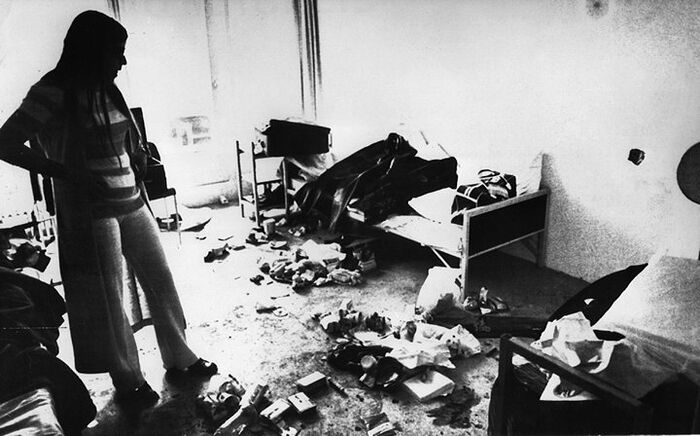 In the aftermath of the terrorist attack
In the aftermath of the terrorist attack
As for the priest—I’ve witnessed so much in my life that I accept such things. Of course, it had to be blessed; awful things had happened there. But, on the other hand, since you are dealing with death almost on a daily basis, when you perform funeral services, you take it in stride.
I think that events like that terrorist attack fit in well with the course of history. The fall of man and universal evil do exist, just as the bloodshed has never stopped around the globe. Our Savior the Lord Jesus Christ was crucified on the Cross and He shed His Blood. I view it as part of the course of human history, and it’s not that it just happened by chance. Such things occur all the time. Yes, it may happen unexpectedly to a particular person, but it is really stream of events. So when I look at the events of today and what was back in 1972, I can't help but reflect on the events of the Russian-Japanese War of the early twentieth century, or the First World War and the events of 1917 with its two coups, or the famine organized by Stalin and the Second World War.
This is the evil that exists in the world. I recently heard on the radio the story of a policeman who participated in the apartment raid at the time, how it all happened, and his experiences there. He shared how the cowardice of some and bravery of others got tangled together and how hard it was, in all that pain, to figure out the result—or rather the lack of it—of this whole mess later.
So, yes, the Germans failed, they weren’t ready, but then later they founded their special services specifically trained to operate during such situations. After that, similar special services have sprung up all over the world.
I walked around that apartment, praying, sprinkling it with holy water and marveling how blood was shed there before but today prayer flows freely around. If you pray in this kind of place, prayer soaks up the evil that took place there. But it’s already a prayerful perspective. After all, those who moved there want to reside and pray there. In that prayer, they find comfort from the Holy Spirit through the sprinkling of the holy water and anointing of all the walls, windows and doors with the holy oil.
Naturally, this Christian prayer, inwardly—no, doesn’t cover it up—but it absorbs pain, blood and death. Because that pain, blood, and death are the outstretched hands of Christ on the Cross. Christ’s labor was manifested clearly in the Garden of Gethsemane, when His sweat was like drops of blood falling to the ground; but it started much earlier than that, at the moment of His Nativity, or rather, even at conception. It absorbs all mankind with its sinfulness and all the horror of His descent to death. And Christ overcomes that death. For us to be able to take it in, we must strive to dig deep; and there is no end to the labor of prayer in this respect. We must immerse ourselves deep into the world of prayer: for that’s where death is swallowed up in victory.
In the blessing of this apartment and other places where atrocities were taking place, prayer itself becomes the vessel containing this reality and depth. It shows why Christ came into this world and how He always remains with us.

